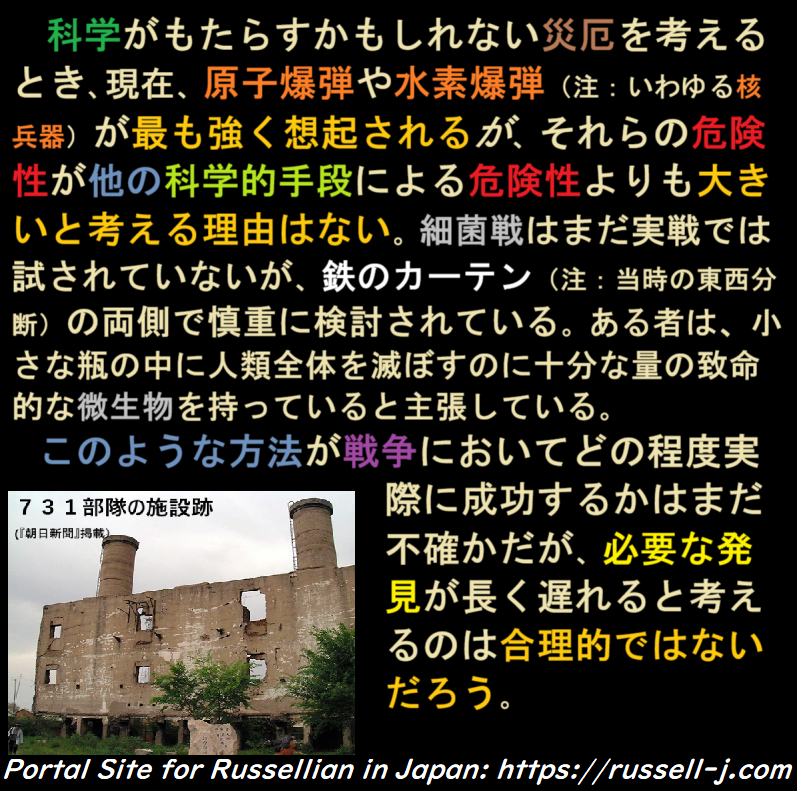
科学がもたらすかもしれない災厄を考えるとき、現在、原子爆弾や水素爆弾(注:いわゆる核兵器)が最も強く想起されるが、それらの危険性が他の科学的手段による危険性よりも大きいと考える理由はない。細菌戦はまだ実戦では試されていないが、鉄のカーテン(注:当時の東西分断)の両側で慎重に検討されている。ある者は、小さな瓶の中に人類全体を滅ぼすのに十分な量の致命的な微生物を持っていると主張している。このような方法が戦争においてどの程度実際に成功するかはまだ不確かだが、必要な発見が長く遅れると考えるのは合理的ではないだろう。
Although atom and hydrogen bombs are at the moment in the forefront of men's imaginations when they think of the disasters that science may bring, there is no reason to believe that the danger which they present is greater than that from other scientific sources. Bacteriological warfare has not yet been tried out in practice, but it is being carefully considered on both sides of the Iron Curtain. There are men who profess to have in a small bottle a sufficient supply of deadly micro-organisms to destroy the whole human race. It is as yet uncertain how far such methods can be successfully practised in war, but it would not be reasonable to suppose that the necessary discoveries will be long delayed.
Source: Bertrand Russell: Human Society in Ethics and Politics, 1954, part II: The Conflict of Passions, chapter 6: Scientific Technique and the Future, n4
More info.: https://russell-j.com/cool/47T-2_0604.htm
<寸言>
各国が生物・化学兵器を研究開発してきましたが、戦争で実際に使われた例はそれほど多くはなく、日本軍の731部隊が第二次世界大戦中に中国でペスト菌・炭そ菌・コレラ菌を使用した例が一番有名です。NHKスペシャルなどで詳細が報道されたことがありますので、皆さんご存じと思われますが、以下、少しだけ経緯を列記しておきます。
・日本の敗戦直前: 731部隊の関係者は証拠書類を焼却し、施設を破壊どこの政府も政府(国)にとって都合の悪い事実は隠したがります。他国の犯罪的行為をあばくことには「寛容」ですが、自国の犯罪的行為をあばくことは「国家機密法違反」となります。
・1946年: 米軍は731部隊の元隊員を調査し、生物兵器のデータを得るために戦犯免責を交渉
・1981年: 作家・森村誠一が731部隊の実態を取材し、『悪魔の飽食』 を発表
→ これにより、日本国内で関心が高まり、731部隊の人体実験や生物兵器開発の事実が広まる。
・1993年: 冷戦終結後、アメリカが731部隊に関する一部の機密文書を公開
・1997年: 中国政府が731部隊の施設跡(ハルビン)を博物館として一般公開
・2018年: NHKが731部隊のドキュメンタリー放送
→ NHKが731部隊の元隊員の証言を取り上げ、「人体実験が実際に行われた」 ことを放送。
ところで、生物化学兵器(biochemical weapons) という言い方がありますが、ChatGPT と対話したところ、「生物化学兵器(biochemical weapons)という表現は正確ではなく、生物兵器(biological weapons)と「化学兵器(chemical weapons)は別のものとして区別するのが一般的であり、生物・化学兵器(biological and chemical weapons)や 「生化学兵器(biochemical and chemical weapons)」 のほうが適切です」と指摘されました。
Various countries have conducted research and development on biological and chemical weapons, but there have been relatively few instances of their actual use in warfare. The most well-known case is that of Unit 731 of the Japanese military, which used plague, anthrax, and cholera bacteria in China during World War II.
Detailed reports on this have been broadcast on programs such as NHK Special, so many may already be familiar with the topic. However, here is a brief summary of key events.
・Japan's imminent defeat (1945): Members of Unit 731 destroyed facilities and burned documents to erase evidence.
・1946: The U.S. military investigated former members of Unit 731 and negotiated immunity from war crimes in exchange for biological warfare data.
・1981: Writer Seichi Morimura conducted an investigation and published The Devil's Gluttony, which exposed the reality of Unit 731.
→ This publication raised awareness in Japan, spreading knowledge about the unit's human experimentation and biological weapons development.
・1993: After the Cold War, the U.S. declassified some documents related to Unit 731.
・1997: The Chinese government opened the ruins of Unit 731's facility in Harbin as a museum for public viewing.
・2018: NHK aired a documentary featuring testimonies from former Unit 731 members.
→ The documentary confirmed that “human experimentation was actually conducted.”
Governments tend to conceal inconvenient truths. While they are "tolerant" when exposing the criminal acts of other nations, revealing their own wrongdoing is often considered a violation of national security laws.
By the way, the term "biochemical weapons" is sometimes used, but after discussing this with ChatGPT, it was pointed out that "biochemical weapons" is not an accurate term. Biological weapons and chemical weapons are generally considered distinct categories, and the more appropriate terms would be "biological and chemical weapons" or "biochemical and chemical weapons."
* Amazon Gift Card
